
Mobile Marketing is Said to Be the Future of E-Commerce
We woke reasonably late following the feast and free flowing wine the night before. After gathering ourselves and our packs,
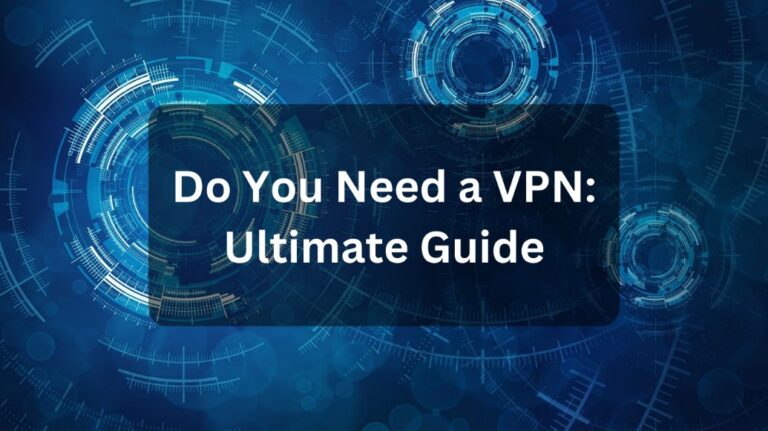
Virtual Private Networks, or VPNs, have become increasingly popular in recent years as more and more people become concerned about their online privacy and security. Everyone is telling us to buy a VPN for or else we won’t survive on the internet. But is it just propaganda started for selling VPNs or a VPN has become an essential part of Internet privacy?
Before we go any further, first we would need to understand what a VPN is.
A VPN or a Virtual Private Network has its definition in its very name. It is a service that lets us connect to the internet through a secure private network. This can also be said as a VPN actually hides your internet activity by adding a layer of protection through an encrypted tunnel. This results in your activities being encrypted so the advertisers and even your ISP (Internet Service Provider) cannot track your online activities.
Here are some steps of how a VPN works:
You start the VPN through an app or software by the VPN provider which then establishes a connection with the VPN server.
The VPN server authenticates your request and assigns you a new IP address.
Your device establishes a secure, encrypted connection with the VPN server.
All of your internet traffic is routed through the encrypted connection to the VPN server.
The VPN server receives your traffic and sends it onto the internet, appearing on websites and other online services as if it is coming from the VPN server’s IP address rather than your own.
When the requested data or web page is returned to the VPN server, it is encrypted and sent back to your device.
Your device decrypts the received data and displays it to you.
Now let us understand with an example.
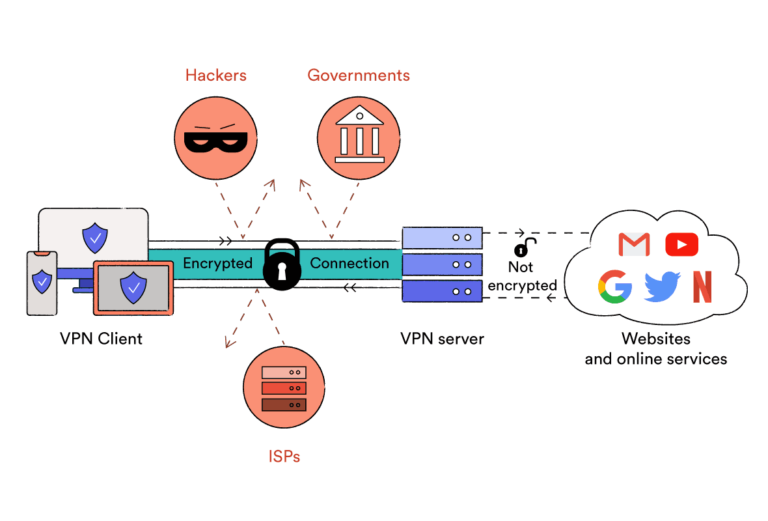
Watch the image above. Here you can see how a VPN works. When the client (VPN user) connects to the internet, the VPN added a layer of protection where the hackers or the surveillance people cannot track your activity as all the activity is done in a privately covered tunnel. Then the request is taken to the VPN server where your whole identity is changed and covered. Now you can roam on the internet without leaving your tracks or footprints.
Now let’s get a bit nerdy.
A tunnel is an encrypted communication with a layer of unencrypted traffic. This is like when you use the crowd as a distraction to issue your objective. Due to the layer, the tracking agencies cannot track the original communication that is encrypted and hidden between the other traffic.
So now suppose you sent a request for something, it is like a car going through a highway with millions of other cars hiding that car so no one knows which is the original encrypted communication or here which is your car.
This process is known as Encapsulation and it is performed by dedicated tunneling protocols.
So now you what is a VPN and how it works but then comes the big question:
Nowadays the use of computers and the Internet are at surge and everyone wants to use the internet according to their will. But not all people on the internet are ethical or moral as some are there to exploit your privacy and security and steal your data or your sensitive information like passwords. We often call them hackers or spammers.
Suppose you go to a cafe and connect to the local wifi of the cafe. Now I know you might have not felt anything wrong in that sentence but Boom, your network may have been hacked.
Now let me explain this, there was a hacker in that cafe who created a Wifi signal the same as the one the Cafe had. Now as your phone is connected to that network, the hacker just got access to your network. This all happened and all he did was fool your device into thinking that the other network is the local cafe’s WIFI which you usually connect to. Without any communication with you, the hacker has accessed your network and if you think this is uncommon, then you might not know that the phones are set to access similar SSIDs if possible and a hacker with experience knows how to do it.
So yeah you were exploited right there and this was just one of many ways your data can be exploited when connecting to an outside network but what if you work from home or
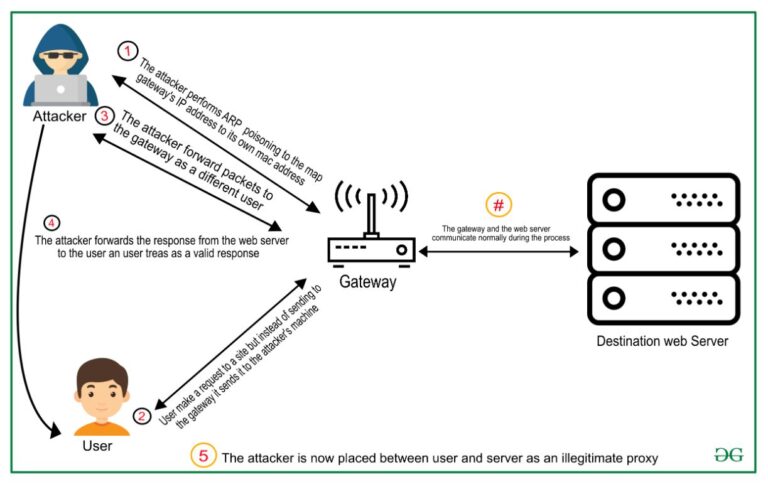
Now let me ask you something, do you think hackers are the only people who are after your personal data and activities? You can’t be more wrong.
Your ISPs, Government, and advertisers, all are interested in that data as it lets them know and track you. ISP means your Internet Service Provider like Earthlink or Verizon or Xfinity or whatever company provides you access to the internet. Maybe the broadband company or the telecom company or even a satellite internet provider like Starlink, all have access to your activities.
All your internet requests go to your ISP and then from there, they are redirected to the designated location, which means an ISP has access to all your data. Now you would be thinking that the data with an ISP is secure and won’t be shared. Actually, it might not just be shared but sold. In countries like the USA, ISPs can legally sell your data to advertisers.
I was terrified when I first heard this thing. Though in Eurozone, it might not be legal, but still now and then we hear leaks from the ISPs or ISPs illegally selling our data.
Now if you have not seen the movie, Snowden or have not heard of Edward Snowden, you might not on what level the govt. agencies are tracking you. I am not anti-govt. or any of that, but I sure don’t want govt. agencies to have the power to keep surveillance on anyone they want. This is like a misuse of power.
So all this data is collected, but why?
Data are becoming the new raw material of business.
– Craig Mundie
Your data is your direct reflection. What you do is what you are and so what you do internet is what you are as that is also done by the same you.
What you search on the web, what movies you like, what products you like, which places do you visit, where would you go, where do you live, what food you like, what devices you use, what do you do, what are your hobbies, every last detail of you is just a data that they will use to advertise to you.
More than 5 Billion people currently have access to the Internet which means this is the place where you can obtain the data of 5 billion people. Think about it. Why would the big companies not want your data, when they can crunch some numbers and some analytics–boom, they now know what you would do, where would you go and what would you buy before you know yourself.
That sounds hard to believe, yet it is the truth.
No a VPN is one of the tools to protect your privacy but it sure is one of the most important ones. A VPN can protect you by hiding you but there are some other precautions that you might wanna take with a VPN. Use a good add blocker or an in-built ad blocker like Firefox offers. This can turn the trackers off. You can also use extensions like EFF Privacy badger to shut those trackers off. Also, use a trusted Antivirus with extensive internet features and protection.
One of the main benefits of using a VPN (Virtual Private Network) is that it helps protect your online activity from being tracked and monitored. When you connect to the internet through a VPN, all of your internet traffic is routed through a secure, encrypted connection to a VPN server. This makes it much more difficult for third parties, such as your internet service provider or the government, to track or monitor your online activity.
Though VPN might not alone be enough for complete privacy, it still is an important tool to use the Internet anonymously.
Anonymity is a shield from the tyranny of the majority.
– John Stevens
One of the main reasons to use a VPN (Virtual Private Network) is to bypass internet censorship. Internet censorship is the practice of blocking or restricting access to certain websites or types of online content by governments, organizations, or even internet service providers. This can be done for a variety of reasons, such as to control the flow of information, to protect national security, or to prevent access to inappropriate or harmful content.
However, internet censorship can also be used to suppress freedom of expression, limit access to information, and restrict access to certain websites or services. In these cases, it is important to find ways to bypass internet censorship in order to have full access to the internet.
A VPN can be an effective tool for bypassing internet censorship. It establishes a secure, encrypted connection between your device and a VPN server, allowing you to access the internet through the VPN server. This can help you bypass censorship by making it appear as if you are accessing the internet from a different location than you are actually in.
Think about an example of a new reporter in China who does not have access to Global news due to their national policy. It would be unfair for him but once he connects to a secure VPN, he can access the internet and the surveillance can not detect that.
You can also use Proxy-servers or Tor for this purpose, but that will not be as effective and will decrease the anonymity. So through a VPN, you can connect with any global site making you accessible to every source.
Sometimes, websites or apps especially OTT platforms restrict some content to a specific country or location. This can be due to a variety of reasons, such as copyright laws, licensing agreements, or government censorship.
One way to access restricted content is by using a VPN (Virtual Private Network). A VPN establishes a secure, encrypted connection between your device and a VPN server, allowing you to access the internet through the VPN server. This can help you bypass restrictions and access websites or services that are blocked in your location.
E.g.- Think of it like a web series launched in the US and there are some fans of the series in the UK. Now due to less following in the UK, the second season is only released in the US. This may be because the platform thinks that it would not be worth the money but this is unfair to the fans of the UK. So they can get a good VPN and access the platform from a US server and stream their content.
You would be surprised to know that, according to a survey by Go-Globe, more than 50% of people use VPNs for restricted content streaming. This means it is the most important use people take out of a VPN.
However, I am not advocating the use of a VPN in streaming unrestricted content and you may first read the terms and conditions before using a VPN for this purpose. Some VPNs allow you to stream content from Netflix, Amazon Prime, Disney+, and many more platforms of any region for free. You can watch Japanese anime in the USA and Europe easily.
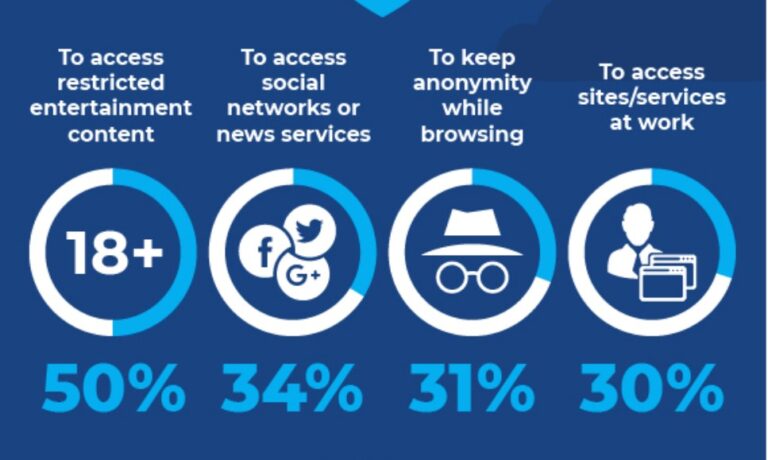
One of the main benefits of using a VPN (Virtual Private Network) is that it can improve your online security. I have already explained it a million times above so you know till now how a VPN improves online security.
The addition of layers through a tunnel protects our information from the agencies and organizations that are tracking us.
In addition to encrypting your internet connection, a VPN can also improve your online security in other ways:
A VPN can protect you from man-in-the-middle attacks, which occur when a third party intercepts and alters the communication between two parties.
A VPN can help prevent your device from being infected with malware or other malicious software by blocking access to known malicious websites.
A VPN can help protect your personal information, such as your name, address, and financial details, by hiding it from websites and online services.
Using a VPN is an effective way to improve your online security and protect your personal information when using the internet. It is especially useful when using public Wi-Fi networks or accessing sensitive information online, such as when banking or shopping online.
But to be honest, you also need to be extra careful as any mistake you make on the internet can cost you all you have in your accounts and there is not a 100% guarantee that you will be safe when using these methods.
Some weeks ago, Twitter’s server got compromised and the data of nearly 200 million people was breached the hackers were selling it on the online market and these incidents keep happening.
Remember precautions are better than cures. So if you are using the internet then you have a digital life and you have to protect its identity.
There are several important factors to remember when choosing a VPN. Remember everyone promotes different VPNs and some are legitimately testing and suggesting them while some are just getting paid for them. So check these factors as they affect the VPN greatly.
When choosing a VPN (Virtual Private Network) provider, it is important to consider the jurisdiction of the company. The jurisdiction of a VPN provider refers to the country or region where the company is located and operates under the laws.
The jurisdiction of a VPN provider can be significant because it can affect the level of privacy and security you can expect from the VPN. Some countries have more stringent privacy laws and protections in place, while others may have more lax regulations or may be more prone to government surveillance.
For example, if you choose a VPN provider located in a country with strong privacy laws, such as Switzerland or Sweden, you can generally expect a higher level of privacy and security from the VPN. On the other hand, if you choose a VPN provider located in a country with weaker privacy laws or a history of government surveillance, such as the United States or the United Kingdom, you may have less privacy and security with the VPN.
Do you know that there are countries that forming alliances for surveillance like 5 eyes or 14 eyes?
The Five Eyes is an intelligence alliance comprising five countries that share intelligence information and have a close working relationship in the field of intelligence. However, their activities have also raised concerns about privacy and the potential for abuse of power. The countries in 5 eyes are the USA, UK, Canada, New Zealand, and Australia. See this image for all countries.
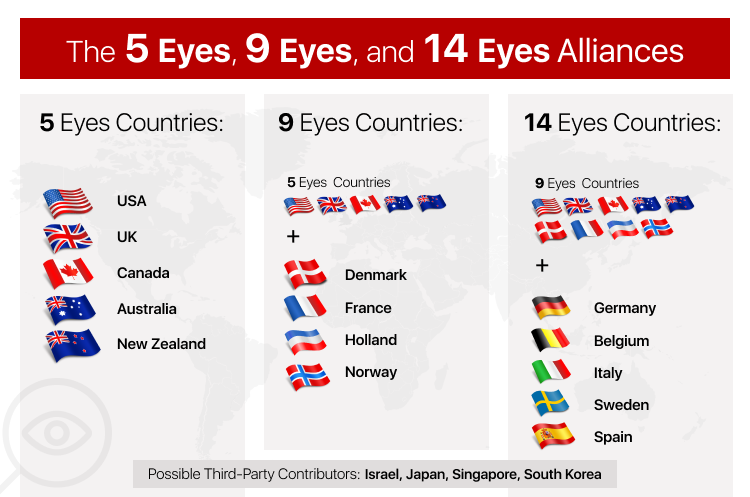
When choosing a VPN (Virtual Private Network) provider, it is important to consider the encryption and security protocols used by the VPN.
Encryption is the process of converting data into a secure, encoded form that can only be accessed by someone with the appropriate decryption key. Security protocols are the rules and guidelines that govern the security of a network or the provider.
There are many different types of encryption protocols. The latest protocols that are widely used are OpenVPN and WireGuard. WireGuard is the latest protocol and is made for the latest devices and processors in mind and thus is faster and more efficient(uses 15% less data). OpenVPN is also not old and can be said to be more trustworthy in these many years of use.
In addition to encryption, it is also important to consider other security protocols used by the VPN, such as Secure Sockets Layer (SSL) and Transport Layer Security (TLS). TLS is the successor of SSL and thus much better. These protocols help secure the connection between your device and the VPN server and protect against potential attacks.
I would recommend choosing a VPN with WireGuard protocol and TLS security protocol. OpenVPN is also safe but WireGuard is a bit fast. This also leads us to our third factor.
As of now, you know VPN works, so it would be easy for you to understand this. When using a VPN, all the traffic and communication goes to the VPN server first, and then after the IP and details are changed, it is forwarded to the destination in an encrypted form.
So it is easy to see that all these processes take time. It might a little for some VPN providers and some might take a bit longer. The speed is lost during the encryption process.
Also when creating the shield and directing the traffic of all users, some servers with heavy traffic might get loaded and the performance is reduced.
So we should look for a VPN which is faster and does not lose speed and performance. You can check out some fastest VPNs on Google.
It does not take a genius to understand that your VPN provider must be supporting the device or operating system you use. Nowadays, all the major VPN providers have apps and software that support all types of devices and operating systems.
You still might check once and remember, if you are thinking of sharing your connection with your family or friends, you should check how many people they allow to share with and does the VPN supports all the devices that you and the person you are thinking of sharing your VPN has.
Though most VPNs automatically detect your device and OS so that might be easy for you.
There is always a price for quality but that does not always mean that more price means more quality. The VPNs are priced mostly the same and if you think a free VPN is safe or good. Wake Up. The free VPNs are not safe and may take and store data.
Now I know VPNs can be a bit costly but there are some VPNs that offer excellent features and safety at cheaper prices. I think it is a small price to pay for privacy as it can cost much more.
Some VPNs cost more like Hotspot Shield (One of the fastest) or Express VPN (One of the most trustworthy). Then there are VPNs that are excellent in privacy and speed and also cost-efficient like Nord VPN or SurfShark.
As I mentioned earlier, a VPN makes the route of the communication or web request a bit longer and the encryption process also takes time. This might reduce the internet speed a bit.
It is similar to when anytime you leave outside, I ask you to go to a certain shop and get dressed first. This will take some extra time and thus reduces speed.
This depends upon your VPN provider and his encryption and security protocols. Some VPNs reduce the speed by only up to 10% while some can reduce the speed to more than 50%. Some VPNs also come with special features to increase the speed.
Not all VPNs can do what they claim or what other premium VPN claim. Some VPNs cannot bypass some regional sites or some bans. This may be due to a lack of servers in that particular area or due to a lack of technology and infrastructure that particular VPN has.
Some VPNs cannot access restricted content on any platform while some cannot access restricted content on any particular platform. You should check properly before investing in a VPN provider as they tend to keep with you for some time.
Also, not all servers are applicable for streaming. Check carefully if you have any intention to watch restricted content as not all servers can be used for streaming and you should check it before buying.
Some VPNs only provide limited server locations due to which some features of a VPN become useless in that area where it does not have a server. If a site only allows the data of that particular country and your VPN provider does not have a server in that country, then you may not be able to access it as any other country is not allowed.
So choose a VPN with more servers and scattered in more locations and countries. This will give you more options to choose from.
Here are some of the VPNs that we have tested and so recommend.
Explore the Best VPNs of 2023 by our experts.
Conclusion: In today’s world where data is stolen and sold like household commodities, I think you should invest in a VPN if needed. This is because privacy is a very expensive thing and so is our security. Everyone is after the data of the users and with the risk increased by AI like Google Assistants and Alexa, it is becoming harder to protect it.
Stay alert, don’t fall for scams, and don’t ever download anything from non-reputable sites no matter how good it sounds. Don’t share your passwords and credentials with anyone.
If you have any questions ask me in the comments.
Thanks for reading. Share this with your family and friends.

We woke reasonably late following the feast and free flowing wine the night before. After gathering ourselves and our packs,

We woke reasonably late following the feast and free flowing wine the night before. After gathering ourselves and our packs,

We woke reasonably late following the feast and free flowing wine the night before. After gathering ourselves and our packs,

We woke reasonably late following the feast and free flowing wine the night before. After gathering ourselves and our packs,

We woke reasonably late following the feast and free flowing wine the night before. After gathering ourselves and our packs,

We woke reasonably late following the feast and free flowing wine the night before. After gathering ourselves and our packs,

We woke reasonably late following the feast and free flowing wine the night before. After gathering ourselves and our packs, we headed down to our

We woke reasonably late following the feast and free flowing wine the night before. After gathering ourselves and our packs, we headed down to our

We woke reasonably late following the feast and free flowing wine the night before. After gathering ourselves and our packs, we headed down to our

We woke reasonably late following the feast and free flowing wine the night before. After gathering ourselves and our packs, we headed down to our

We woke reasonably late following the feast and free flowing wine the night before. After gathering ourselves and our packs, we headed down to our


